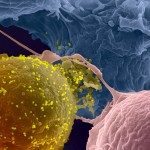Lien vers Pubmed [PMID] – 11825573
Immunity 2002 Jan;16(1):145-55
DC-SIGN, a dendritic cell (DC)-specific lectin, mediates clustering of DCs with T lymphocytes, a crucial event in the initiation of immune responses. DC-SIGN also binds HIV envelope glycoproteins, allowing efficient virus capture by DCs. We show here that DC-SIGN surface levels are upregulated in HIV-1-infected DCs. This process is caused by the viral protein Nef, which acts by inhibiting DC-SIGN endocytosis. Upregulation of DC-SIGN at the cell surface dramatically increases clustering of DCs with T lymphocytes and HIV-1 transmission. These results provide new insights into how HIV-1 spreads from DCs to T lymphocytes and manipulates immune responses. They help explain how Nef may act as a virulence factor in vivo.

